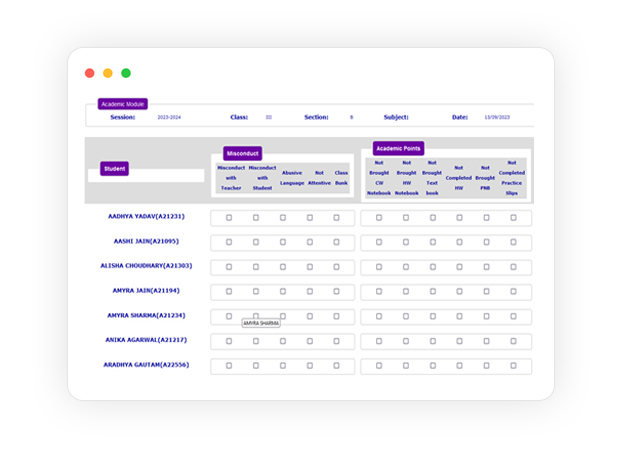A Student Behavior Management module within a School Management System (SMS) or School ERP is a valuable tool for educational institutions to effectively track, manage, and improve student behavior.
Here are key features and benefits of such a module:
Features
1. Behavior Tracking
- Records and tracks student behavior incidents, including details such as date, time, location, and descriptions of the behavior.
2. Behavior Categories
- Categorizes behavior incidents into predefined categories (e.g., academic misconduct, disciplinary issues, attendance-related) to facilitate analysis.
3. Consequence Management
- Defines consequences or disciplinary actions for inappropriate behavior, ensuring consistency in responses.
4. Incident Documentation
- Provides a platform for teachers and staff to document incidents, interventions, and outcomes for each student.
5. Behavioral Analytics
- Offers analytics and reporting tools to identify patterns, trends, and high-risk behaviors among students.
6. Parent Notifications
- Automatically notifies parents or guardians when their child is involved in a behavior incident, promoting transparency and collaboration.
7. Intervention Plans
- Allows the creation of intervention plans for students displaying persistent behavioral challenges, outlining steps for improvement and support.
Benefits
- Behavior Improvement: Promotes positive behavior and encourages students to be accountable for their actions.
- Consistency: Ensures consistent handling of behavior incidents and consequences across the school, creating a fair and structured approach.
- Transparency: Keeps parents and guardians informed about their child's behavior, fostering open communication between home and school.
- Data-Driven Decision-Making: Provides data and insights into student behavior patterns, enabling educators to make informed decisions and implement targeted interventions.
- Early Intervention: Identifies at-risk students early, allowing schools to provide timely support and interventions to address behavior issues.
- Efficiency: Streamlines the process of recording, tracking, and managing behavior incidents, reducing administrative workload.
- Accountability: Holds students accountable for their actions by providing clear documentation of behavior incidents and consequences.
- Positive School Culture: Contributes to a positive school culture by reinforcing expected behaviors and values.
A Student Behavior Management module is essential for maintaining a positive and productive learning environment. It helps schools address behavior issues proactively, promote responsible behavior, and ensure consistent responses to incidents, ultimately supporting the overall well-being and success of students.



